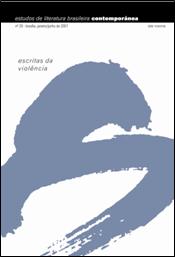Walter Benjamin:
o estado de exceção entre o político e o estético
Abstract
O texto apresenta o conceito de Ausnahmezustand (“estado de exceção”), pensado tanto em termos políticos como no âmbito teórico-metodológico, como um conceito central que atravessa
o pensamento de Walter Benjamin. Após apresentar as teses centrais do ensaio de 1921, “Zur Kritik der Gewalt”, o texto retoma o percurso da leitura deste ensaio de Benjamin da parte de Carl Schmitt, bem como o diálogo entre estes dois intelectuais. Ele ainda apresenta comoquestões centrais do ensaio de 1921 são retomadas no livro sobre o Trauerspiel (drama barroco alemão) de 1925 e nos textos escritos no contexto do Passagen-werk (Trabalho das passagens), com destaque para o “Sobre o conceito da história”, de 1940.
References
AGAMBEN, Giorgio. Estado de exceção. Trad. I. Poleti. São Paulo: Boitempo, 2004.
BENJAMIN, Walter. “Zur Kritik der Gewalt”, em TIEDEMANN, R. e SCHWEPPENHÄUSER, H. (org.). Gesammelte Schriften. Frankfurt a. M.: Suhrkamp, vol. II: Aufsätze, Essays, Vorträge, 1974. pp. 179-203.
______. “Crítica da Violência. Crítica do Poder”, em BENJAMIN, Walter. Documentos de Cultura, Documentos de Barbárie. Trad. e org. de Willi Bolle. São Paulo: Cultrix/EDUSP, 1986. pp. 160-75.
______. Gesammete Briefe. Band II. 1919-1924. Org. por Ch. Gödde e H. Lonitz. Frankfurt a. M.: Suhrkamp, 1996.
______. Gesammete Briefe. Band III. 1925-1930. Org. por Ch. Gödde e H. Lonitz. Frankfurt a. M.: Suhrkamp, 1997.
______. Origem do drama trágico alemão. Trad. de João Barrento. Lisboa: Assírio Alvim, 2004.
BREDEKAMP, Horst, “From Walter Benjamin to Carl Schmitt, via Thomas Hobbes”. Critical Inquiry, v. 25, nº. 2, Winter 1999, pp. 247-66.
DERRIDA, Jacques. Force de Loi. Le “Fondement mystique de l’autorité”. Paris: Galilée, 1994.
ÉSQUILO. Oréstia. Agamêmnon, Coéforas, Eumênides. 6ª ed. Trad. de Mário da Gama Kury. Rio de Janeiro: Jorge Zahar, 2003.
NIETZSCHE, F. “Jenseits von Gut und Böse, Zur Genealogie der Moral. Eine Streitschrift”, em COLLI, G. e MONTINARI, M. (org.). Kritische Studienausgabe. München: DTV/ Berlin-New York: Walter de Gruyter, 1988. v. 5.
______. Genealogia da Moral: uma polêmica. Trad. de. Paulo C. Souza. São Paulo: Companhia das Letras, 1998.
SCHMITT, Carl. Politische Theologie. Vier Kapitel zur Lehre von der Souveränität. München, Leipzig, 1922. [7ª ed. Berlin: Duncker & Humblot: 1996].
______. Hamlet o Hecuba. La irrupcion del tiempo em el drama. Trad. de R. Pastor. Valencia: Universidad de Murcia, 1993.
SELIGMANN-SILVA, Márcio, “Catástrofe, história e memória em Walter Benjamin e Chris Marker: a escritura da memória”, em SELIGMANN-SILVA, Márcio (org.). História, Memória, Literatura: o testemunho na era das catástrofes. Campinas: Editora da UNICAMP, 2003. pp. 391-417.
______. “Após o ‘Violento Abalo’. Notas sobre a arte ”“ relendo Walter Benjamin”, em SELIGMANN-SILVA, Márcio. O local da diferença: ensaios sobre memória, arte, literatura e tradução. São Paulo: Editora 34, 2005. pp. 19-30.
TAUBES, Jacob. Ad Carl Schmitt. Gegenstrebige Fügung. Berlin: Merve, 1987.
WEBER, Samuel, “Taking Exception to Decision: Walter Benjamin and Carl Schmitt”. Diacritics, v. 22, nº. 3/4, Fall-Winter 1992, pp. 5-18.
Downloads
Published
Issue
Section
License
Authors who publish in this journal agree to the following terms:
a) The authors maintain the copyright and grant the journal the right of first publication, the work being simultaneously licensed under the Creative Commons Attribution License-Non Commercial 4.0 which allows the sharing of the work with acknowledgment of the authorship of the work and publication this journal.
b) Authors are authorized to enter into additional contracts separately, for non-exclusive distribution of the version of the work published in this journal (eg publish in institutional repository or as a book chapter), with authorship recognition and publication in this journal.
c) Authors are allowed and encouraged to publish and distribute their work online (eg in institutional repositories or on their personal page) after the editorial process, as this can generate productive changes, as well as increase the impact and citation of published work (See The Effect of Free Access).
d) The authors of the approved works authorize the magazine to, after publication, transfer its content for reproduction in content crawlers, virtual libraries and the like.
e) The authors assume that the texts submitted to the publication are of their original creation, being fully responsible for their content in the event of possible opposition by third parties.


